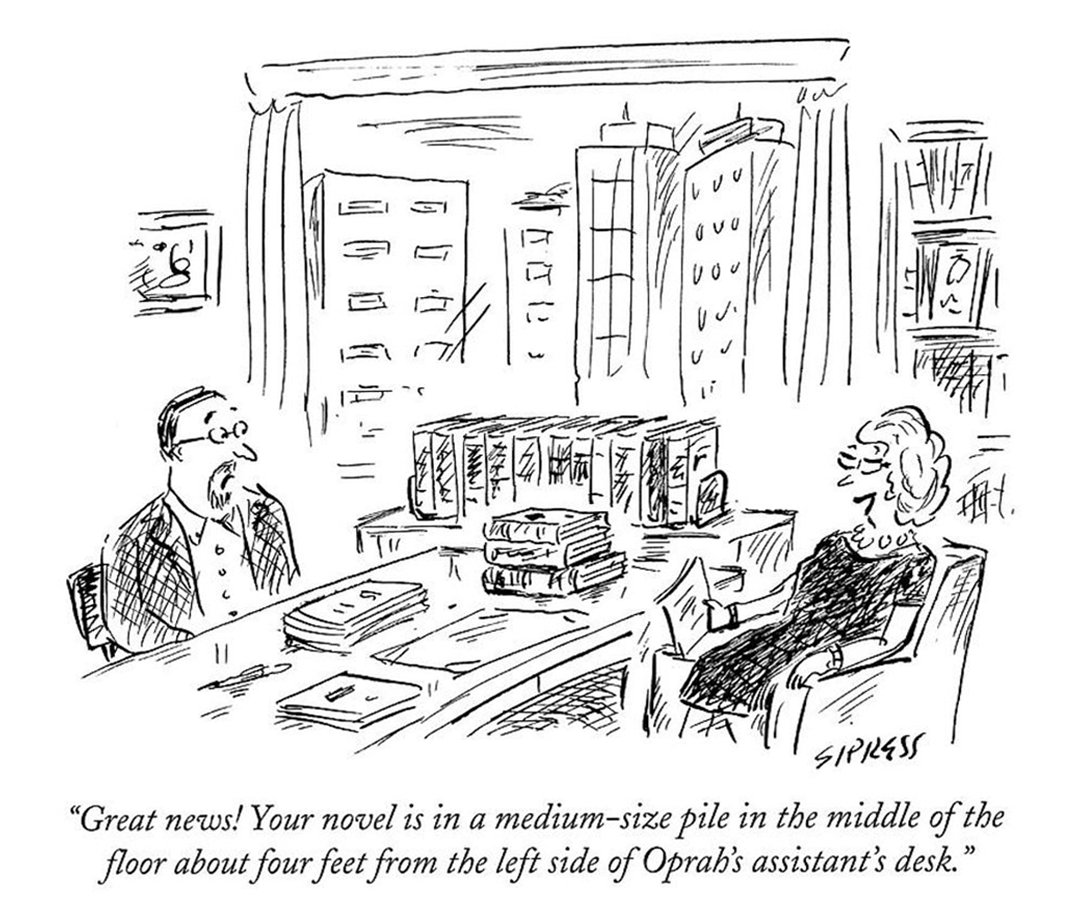My best advice for getting an agent doesn’t have anything to do with agents. It’s this: If you’re still writing your book, forget about agents. Forget about publishing. Don’t be attached to results at all. Just write. Write because you love exploring the mystery and infinite possibility that is life. Write because you can’t not write. You certainly shouldn’t be writing because you want to be rich and famous!
My second best agent advice: Finish your book. Most agents won’t read a partially-completed debut novel or memoir.
Third piece of advice: Make sure you’re ready. The good news is, there are hundreds of agents. And not just in New York. They’re in San Francisco, Denver, DC, Boston. All around us. The not-so-good news: You only get one shot at each agent. So make sure you’re sending your best effort. Find an outside reader, someone you trust. And please, make sure that trusty someone checks your grammar and punctuation. You don’t want to write it’s when you mean its.
Now. You’ve polished your manuscript to a shine and you’re ready to begin the search.
Subscribe to Publishers Marketplace. It costs $20 a month and you can unsubscribe at any time. If you’ve written a memoir, you’ll find the names of agents who’ve sold memoirs. If you’ve written a novel, you can narrow your search to agents who sell the type of novel you’ve written — thriller, romance, etc. You can even see the titles an agent has sold during the past six months, the past twelve months. You can also pull up a list of top agents, the ones who’ve sealed the most deals.
And, speaking of deals, there’s plenty to be said for querying busy, successful agents. They’ll have access to the top editors. On the other hand, a busy, successful agent might be too busy and successful to pay you much attention. Newer agents might work harder for you because they’re hungry. On the other hand, a new agent might not have access to the editors you’re dreaming of. Regardless of whether your agent is a top dealmaker or on the way up, your goal is to land someone who believes in your work. You want someone who wants you.
Another way to find agent names is to go to a bookstore or library and read the Acknowledgements Page of books similar to the one you’ve written. Authors frequently will thank their agents.
You can also try the Association of Authors’ Representatives. You know that these agents are ethical. Of course, there are many ethical agents who choose not to be AAR members. But this is another route to finding agent names.
Try Agent Query for all sorts of info: agent lists, advice on query letters, etc.
You can also find info on agents in Literary Marketplace, a book found in most libraries and bookstores.
Regardless of how you acquire your list of agents, visit their websites and follow their specific guidelines for submission. If an agent requests the first five pages with your query letter, send the first five pages. Don’t slip in an extra three. (But don’t stop in the middle of a sentence! Stop before that, at a logical place.) This is an opportunity to show how cooperative you can be. Single-space your query letter. Double-space your manuscript in 12 pt. type (I use Times New Roman font). Number the pages of your manuscript and include a cover page giving the title, your name and address, email address, and phone number.
Remember, your query letter is super-important. Work hard and long on it.
Of course, you’ll give the title of your book in the first or second paragraph, but also mention you’ve recently finished it, as in:
Pasted below are the opening pages of my newly completed novel, The Birds and the Bees. Would you consider reading the full manuscript?
If you have publishing credits, list those. If you have an MFA or other advanced degree, mention that. No bragging though. Do not say that your friends think your memoir is great. Do not say you know the world will love your novel. Include a brief synopsis — several sentences, maybe a paragraph. I believe that if you tell too much, you run the risk of giving the agent a reason to pass. You can offer several ideas for how a publisher might promote your particular book. But keep your query letter brief (one page maximum) and businesslike. Don’t crack jokes. They probably won’t work. You might want to compare your book to a similar one that’s been published. You might want to tell why your book stands out from others in its category. If you query a particular agent because he/she represents an author you admire, mention that.
Most agents prefer email submissions. And most ask you to embed your writing sample in the body of the email. If they like what they’ve read, they’ll request your full manuscript sent as an attachment.
And remember, no reputable agent charges a fee to read your manuscript. Agents make their money by selling your book. They earn 15% of your advance (half given to you on signing with a publishing house and half on completion of what the publisher deems a publishable manuscript). They also earn a percentage of your sales. An agent does not make a dime until your book is sold.
Keep track of the agents you’ve queried and their response. Give an agent 4-6 weeks to respond. If you don’t hear back, you can email to inquire about the status, although many agents specify on their websites that if you don’t hear back within a certain time, it means they’ve passed. You may query more than one agent at a time. In fact, I recommend querying five to ten agents. That way, if you receive feedback on your book as part of a rejection, you’ll have a chance to revise your book before trying the next batch.
If an agent offers representation, express your excitement and appreciation. It is cause for celebration! If other agents are reading your full manuscript at the time, you can ask the agent who has offered representation how long before you need to make a decision. Then email the agents who have your full manuscript and let them know you’ve received an offer. They might rush to read your manuscript and make offers, too. Then you’ll have a choice!
Feel free to ask an agent who has offered you representation questions. For example: What do you like about my book? Does it need a lot of revision? Will you let me know ahead of time the editors you’re pitching? How often can I expect to hear from you once you begin submitting my book? How soon do you give up?
Most agents, after you sign, will offer editorial advice on your book. That’s a good thing! Listen up!
Mainly, I want to wish you good luck. I also want to encourage you to keep trying. It’s all about perseverance.
As Fred Leebron, an excellent writer, once said to me, It’s a war of attrition. Don’t attrish.
And then there’s the quote taped to my computer: Success is the ability to go from failure to failure without losing your enthusiasm. We’re trying, Winston Churchill!






Oh man. This was stellar to read today as I just start this journey. I will be here every day. lol {Laurie sent me} xo
Amy, thanks so much for your comment. I’m really glad you feel that my post will help you. Good luck! Just keep at it. This is a good time of year to be seeking an agent. I hope the whole thing goes swimmingly!
xo
Judy
Amy, one more thing: I went to your website. It’s beautiful! I love the photo of the little boy holding a wooden mustache!
Thank you for this. I was recently contemplating unearth an old writing that has intentions of becoming a book, and had been wondering whether to do a proposal or finish it first! I’ll just tuck back in full tilt next week. :)
(Laurie sent me too.)
Twitter sent me here and I am so glad to have read this. Thank you for the wonderful advice, and for sharing the quote in the end as well.
Thanks, Summer! Thanks, Roxanne! Keep going!
Judy, I came over to your blog via Glenda Beall’s blog. I’m in the process of writing a memoir about living in the islands. You’ve offered clear and concise advice and I’ve made note of every word. Now I must polish and shine my final version.
I think you’ve given me just the incentive I’ve needed. Perhaps one of the reasons I haven’t finished is that I’m afraid of the next step – agents and query letters.
I stay busy with my food blog and now I realize I should be devoting some time each day to finish writing my memoir. BTY, I love the Winston Churchill quote. That’s a great one.
Sam
Thanks, Sam, for writing to me. Your memoir sounds interesting. Just write that book and worry about agents and query letters later!
Good luck to you in seeing your project through,
Judy
Our small Charlotte book club (8 members ranging in age from late 30s to late 70s) is doing something different for us this year. Every month we have a theme. We have had historical fiction, poetry, and in June our theme is “local author”. We will be reading your book “The Slow Way Back” and would love if you could attend. Our meeting is on Thursday, June 16, from 6:30 PM to 8:30 PM and we are located in the Sardis Woods community, which is off of Sardis Road North. Our group’s name is BLIS (Book Lovers in Sardis). Hoping to hear from you!
Oh my goodness, Christine, I don’t think I ever replied to you and I feel awful about that. Thank you for reading my book. I’ve missed your book club by 6 years!! Please know, though, how pleased I am that you chose my book. Readers like you and the other BLIS members make what we writers do seem worthwhile.
All the best — and so many apologies,
Judy
Hi Mrs. Goldman,
I know you posted this something like seven years ago, but I still wanted to offer my gratitude for it. I have found that many successful authors rarely share knowledge in the way that your blog does. Thank you for giving sound advice, for not speaking down to aspiring authors, but instead rooting us on. I was encouraged by you today before the sun ever came up. I am very grateful.
Warm Regards to you and yours,
Hannah
Hello, Hannah!
Thanks so much for writing to me. I AM rooting for you! All of us writers need encouragement — it’s a lonely, isolating, and odd thing that we do. But we need to keep going and see our projects through.
All the best to you,
Judy